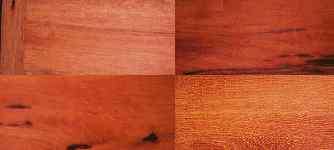
Mkoulouku (Strychnos sp.)
Family: Loganiaceae
Common names: Mkoulouku
Distributed in: Brazil, Cameroon, Columbia, Comoros, Congo, Costa Rica, Equatorial Guinea, French Guiana, Gabon, Ghana, Guyana, Honduras, Ivory Coast, Tanzania, Venezuela, Zaire (Africa)
Distribution overview: The genus Strychnos consists of several species of shrubs, vines, and small to medium-sized trees which are distributed in most of the tropical regions of the world.
Common uses: Balusters, Bedroom suites, Building construction, Building materials, Cabinetmaking, Chairs, Chests, Concealed parts (Furniture), Construction, Core Stock, Decorative plywood, Decorative veneer, Desks, Dining-room furniture, Domestic flooring, Dowell pins, Dowells, Drawer sides, Factory flooring, Figured veneer, Fine furniture, Floor lamps, Flooring, Furniture , Furniture components, Furniture squares or stock, Hatracks, Interior construction, Kitchen cabinets, Light construction, Living-room suites, Mine timbers, Moldings, Office furniture, Parquet flooring, Pile-driver cushions, Piling, Plain veneer, Plywood, Poles, Turnery, Veneer
Product sources: Species in the genus are less important as a source of timber than for some of their non-timber products. St. Ignatius bean or Igasud (S. ignatti), a woody vine that is found in the forests of the Philippines, produces seeds which are a source of strychnine. S. toxifera , which occurs from Brazil to Costa Rica, yields Curare which is considered as one of the deadliest poisons. The poison is obtained from the bark and roots, and is widely used by some native Indians in South and Central America for poisoning their arrows. Curare paralyze almost instantaneously and soon causes death, even in very small doses.
Environment profile: Vulnerable
Tree size: Trunk diameter is 200-250 cm
Colors: the heart isYellow, Yellowish brownand the sapwoodWhite, Yellow.The grain isStraight to interlocked, the textureUniformand the lusterMedium
Natural durability: Susceptible to termite attack, Very durable
Odor: No specific smell or taste
Kiln Drying Rate: Rapid
Drying Defects: Severe surface checking, Splitting
Ease of Drying: Slowly
Blunting Effect: Severe
Boring: Fairly easy to very easy
Carving: Fairly Easy to Very Easy
Cutting Resistance: Easy to saw
Gluing: Fairly Easy to Very Easy
Mortising: Poor to Very Poor
Moulding: Very Good to Excellent
Movement in Service: Very Good to Excellent
Nailing: Pre-Boring Recommended, Very Good to Excellent
Planing: Very Good to Excellent
Resistance to Impregnation: Resistant sapwood
Response to hand tools: Responds Readily
Routing recessing: Very Good to Excellent Results
Sanding: Very Good to Excellent Results
Veneering qualities: Veneers easily, Veneers moderately easy
Steam bending: Fairly Easy to Very Easy
Screwing: Fairly Easy to Very Easy, Very Good to Excellent Results; Turning: Very Good to Excellent Results
Polishing: Very Good to Excellent; Staining: Very Good to Excellent; Varnishing: Fairly Easy to Very Easy;
- Numerical data Metric
- Numerical data English
- Strength properties
- References
 |
 |
 |
 |
| Item |
Green |
Dry |
Metric |
| Specific Gravity |
|
|
|
| Density |
|
|
kg/m3 |
| Bending Strength |
620 |
937 |
kg/cm2 |
| Crushing Strength |
310 |
533 |
kg/cm2 |
| Hardness |
|
|
kg |
| Impact Strength |
|
|
cm |
| Shearing Strength |
|
130 |
kg/cm2 |
| Stiffness |
|
|
1000 kg/cm2 |
| Tangential Shrinkage |
|
|
% |
| Radial Shrinkage |
|
|
% |
| Weight |
|
|
kg/m3 |
| Maximum Load |
|
|
cm-kg/cm3 |
| Toughness |
|
|
cm-kg |
| Static Bending |
|
|
kg/cm2 |
|
 |  |  |  | | Item | Green | Dry | English | | Bending Strength | 8820 | 13328 | psi | | Maximum Crushing Strength | 4410 | 7595 | psi | | Shearing Strength | | 1862 | psi | | Stiffness | 1519 | 1764 | 1000 psi | |
Compression strength (parallel to grain) = high
Bending strength (MOR) = high
Bolza, E., Keating, W.G.,1972,African Timbers - the Properties, Uses and Characteristics of 700 Species,C.S.I.R.O. Div. of Building ResearchRecord, S.J. and R.W. Hess. 1943. Timbers of the New World. Published on the Charles Lathrop Pack Foundation, Yale University Press, New Haven CT.Reyes, L.J. 1938. Philippine Woods. Department of Agriculture and Commerce, Technical Bulletin 7, Commonwealth of the Philippines, Bureau of Printing, Manila.
|








